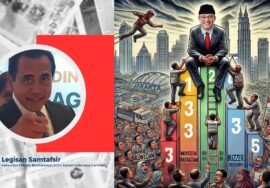
Hajj: A Momentum for National Integrity Reform
By Dr. Legisan Samtafsir, M.Ag, Founder of the Indonesia Mabrur Movement
The call to Hajj has come again… To fulfill the pilgrimage… The call of the House of Allah…
Yes, the Hajj season has arrived. Indonesian pilgrims began entering embarkation points on May 1, 2025, with the first departures scheduled the following day. The excitement is palpable as 221,000 Indonesian pilgrims prepare to depart for the Holy Land of Mecca. It is truly a magnificent event.
If they were cultural ambassadors, it would be a global-level grand performance. If they were a war caravan, they would be a bulldozer crushing enemy fortresses. If they were citizens of a nation, they would become ‘agents of national reform’ upon returning from Hajj.
It all depends on how we view it. Normatively, every ritual act of worship in Islam is never revealed in a vacuum—it always comes with context. For instance: “Pray to prevent immorality and wrongdoing”, “Fast so that you may become righteous”, “Worship so that you may attain piety”, “Take provisions, and the best provision is taqwa”, and “Be pious to become the noblest among you.”
Thus, all ritual acts of worship have an intended outcome—something to be achieved. Striving to achieve that outcome is, in fact, a purposeful and productive mindset. It is not merely about performing the rituals or going through the motions, but rather about attaining the intended result.
This also applies to Hajj; it is not enough to view it as merely fulfilling the rituals and requirements. We must ask: what is the goal after the Hajj? What transformation should follow?
Hajj is indeed an act of worship. But if we apply this goal-oriented mindset, then the pilgrimage should result in a meaningful outcome—one we hope to see upon the pilgrims’ return: a tangible improvement in the nation’s integrity.
A Crisis of Integrity?
Yes, Indonesia is facing multiple states of emergency. As stated by Dr. Abdullah Hehamahua, former advisor to the Corruption Eradication Commission (KPK) from 2005–2013 and Chairman of the Majelis Syuro of the Masyumi Party, “Indonesia is currently experiencing five simultaneous crises: corruption, drugs, family disintegration, law enforcement, and nationalism.” At the root of all these crises lies a deeper crisis: a crisis of integrity.
Consider this: according to the IPSOS Global Trustworthiness Index 2023, public trust in the police is only 27%, in government employees 32%, and in politicians just 24%. KPK data shows that between 2020 and 2024, there were 2,730 corruption cases handled. From 2004 to 2019, KPK statistics show a terrifying increase—from 27 cases to 736 cases annually (www.kpk.go.id).
In terms of the family crisis, data from 2010 to 2015 shows a 15–20% increase in divorce rates, and from 2015 to 2020, that increase surged to 72%. Regarding the drug emergency, the prevalence rate stands at 1.7%, meaning around 3.3 million Indonesians aged 15–64 misuse drugs (BNN-RI data).
These numbers reinforce the fact that Indonesia is in crisis. The pressing question is: can this massive Hajj movement produce a transformation in national integrity?
As the highest leader of the nation, President Prabowo should take this question seriously—not merely seeing Hajj as a personal obligation for citizens, with the government simply acting as a service provider. Instead, the government must ensure that Hajj serves as a national momentum for reform and revival.
Allah’s promise is clear: “If only the people of the towns had believed and been mindful of Allah, We would have opened to them blessings from the heavens and the earth.” But this promise is only fulfilled if Hajj is performed optimally—producing pious individuals who bring about wide-reaching societal reform. This should be our shared endeavor, one that must be encouraged by the Head of State, President Prabowo.
On the part of the pilgrims, they must carry a strong intention to perform the Hajj sincerely—aiming to reform themselves, their families, communities, and ultimately, the nation. On the part of Hajj officers, travel agencies, and Hajj guidance groups (KBIH), they must be fully committed not only to fulfilling the rituals correctly but also to imparting a deeper understanding and meaningful reflection on Hajj as a path to improving faith, principles, and ethical conduct in personal and professional life.
The 2025 Hajj season is indeed a blessing from Allah for Indonesia. It coincides with the beginning of a national transformation movement led by President Prabowo. We must welcome this with joy and enthusiasm.
Let us ensure that the souvenirs from Hajj are not limited to dates, zamzam water, prayer rugs, prayer beads, and robes—but most importantly, a reformation of national integrity. This is the social capital that will drive Indonesia’s development towards its Golden Era in 2045.
So take heed, O people of insight.
(Fa’tabiru ya ulil albab)







